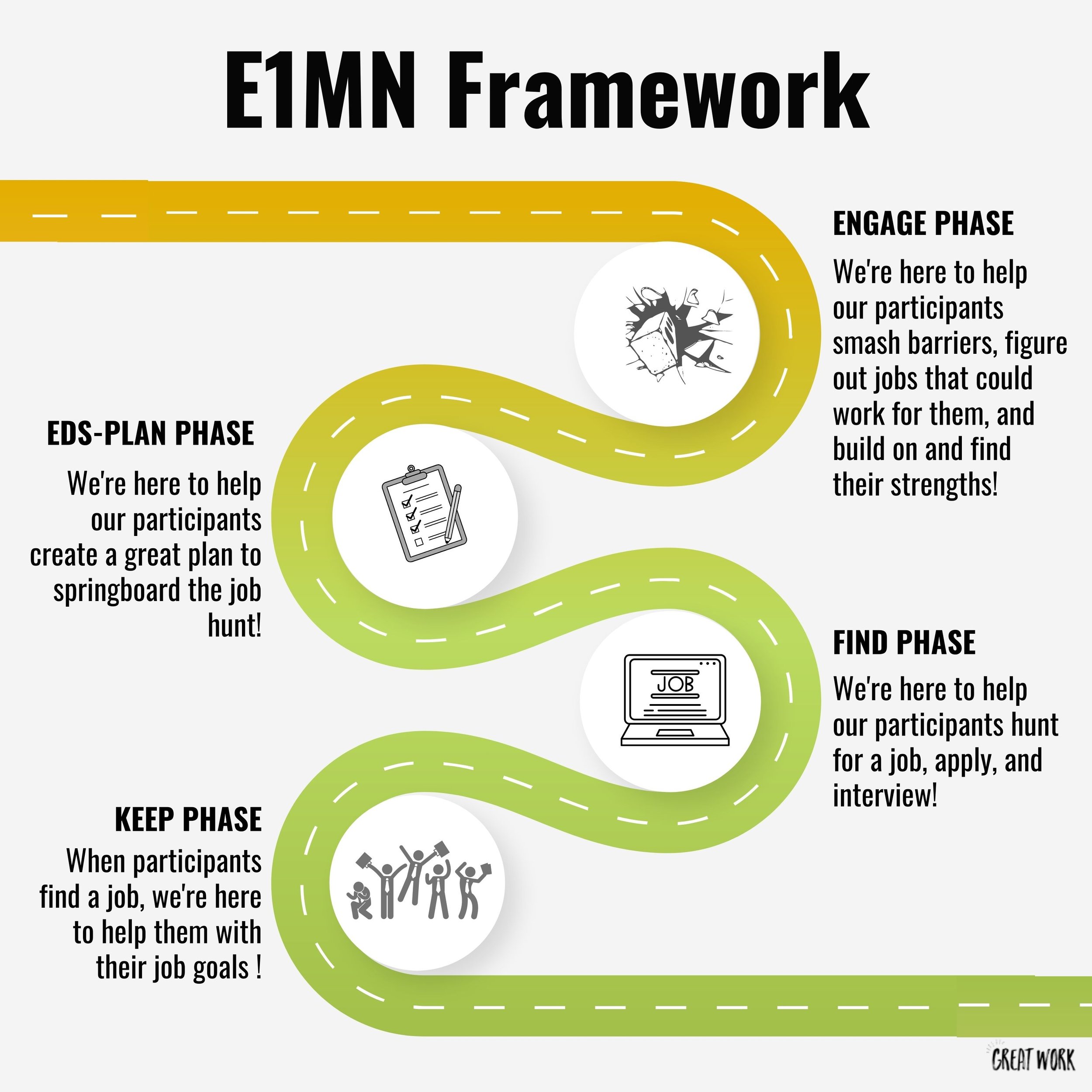Ongoing Support
Ongoing Support Overview
Getting a job is exciting! Great Work is here to be a positive person who gives great workplace guidance and support. We want to be building independence into our services and NOT doing the tasks for participants.
Use the Ongoing Support form to gather the job site information to put in REV.
Great Work practices these positive support techniques:
Follow individualized strategies in a person’s coordinated service and support plan and coordinated service and support plan addendum.
Shift the focus by verbally redirecting the person to a desired alternative activity
Model desired behavior
Reinforce appropriate behavior
Offer choices, including activities that are relaxing and enjoyable to the person
Use positive verbal guidance and feedback
Actively listen to a person and validate their feelings
Create a calm environment by reducing sound, lights, and other factors that may agitate a person
Speak calmly with reassuring words, consider volume, tone, and non-verbal communication
Simplify a task or routine or discontinue until the person is calm and agrees to participate
Respect the person’s need for physical space and/or privacy
Important Information: Aim to complete 1 Employment Support Assessment a month. If your client is very independent and stable, this is a great chance to highlight strengths!
Ongoing Support Resources:
-

On-Going Employment Support Plan
Print this form and use it to record important information about a participant's job, work performance, and support needs. .
*Fields mirror the information to be collected and input into REV for all participant jobs.
-

Employment Support Assessment
Staff should periodically complete this form while observing and supporting an individual on the job. This is great to complete with your participant as a means of reflection.
The documentation can help support
independence in the case of employers
or guardians requesting a job coach.
The documentation provides proof of great work in case the participant wants additional job duties raises, or promotions.
This support assessment gives other ECMs great documentation to collaborate or brainstorm off of.
This support assessment gives your participant a chance to reflect on their workday and how they work.
-

Goal Setting Activity
This quick guide walks your participant through how to make a goal!
If a participant is interested, goal setting is a great way to go above and beyond at the worksite. These goals should be employment-related and focused on their current job.
Employees who goal set are more likely to get raises and promotions.
-

Your First Month Employed
“Your First Month Employed” consists of tricks, activities, and helpful resources to keep your participant organized.
Contents:
Before Your First Day
Your First Day
Your First Week
Your Second Week
Your Third Week
Your Fourth Week
Beyond Your First Month
-

Learning Names
This is an activity to help your participant remember names. Use it to help your participant make associations between the person’s name and something else to remember.
-

Conflict Resolution
This has scenarios and tips for solving conflict.
-

PTO Slideshow
This describes PTO and has follow up questions.
My participant wants more hours. What should I do?
If a participant wants to try to be crossed trained or take on additional responsibilities, we can ask if they’d like Great Work to assist them in communicating that with their employers or HR. That may allow for them to be scheduled for more hours.
What if the supervisor or HR says not right now?
Ask if there are any job duties or parts of their day that they don’t like doing... maybe a manager doesn’t like opening the store on the weekend.
Ask for any feedback or ways your participant can show initiative! They may need some room to grow to take on some duties, so it’s important to try to hammer those out and work on them. Employers love to see employees wanting to grow.
Your participant could let their employers know how much they love their job and wants to stick around. They’d be a great investment to train in additional duties – no matter how small they may be.
My participant becomes distracted at work and wants to talk to me. What should I do?
Use positive redirection to redirect your participant to the task at hand.
If you notice that you may be a distraction, create some space between the two of you.
My participant is refusing to work. What should I do?
You should have a conversation with your participant to make sure that they are educated and informed that their actions at their job have consequences. It is their choice not to work, but it is also their place of employment's choice to not put them on the schedule or terminate as a result.
The E1MN Framework
The Employment First Minnesota Framework (E1MN) is designed to help make sure that Great Work helps our participants explore employment, plan for employment, find a job, and keep a job that is a perfect fit for them! Click below to learn more about each phase:

